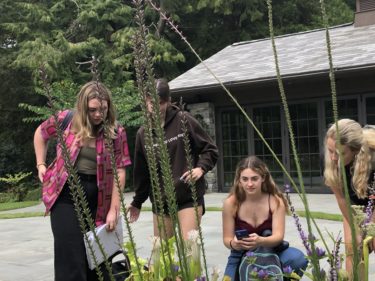Celebrating National Poetry Month: Part 3

Photo: Catherine Staples
Villanova’s Nature Writing Workshop takes place almost exclusively out of doors. Last fall, students read and wrote their way through the gardens, meadows, and woods of Stoneleigh: a natural garden. Over the next few weeks, in honor of National Poetry Month, this blog will feature student work from Nature Writing Workshop 2021.
Carrie Sweeney. Villanova University Class of 2022; English & Humanities Major, Education & Creative Writing Minors
The power of nature as a generative force for ideas often strikes in the most unlikely moments. Fueled by a semester of Nature Writing at Stoneleigh, I wrote this poem from a little library I stumbled across on the second floor of a retreat house, looking out over the woods. Learning how to describe the natural world- how to name things, how to seek magic in the seeds of the earth, how to recognize daily patterns—is something I will always carry from my time in class at Stoneleigh.
The Second-Floor Library
Step in, inhale the cosmos printed,
Your mind equipped to alchemize.
The atmosphere is auburn-tinted
And glancing up, you recognize:
That grain of wood with dark brown bruises
And ember streaks—you know the kind—
The shelves are stocked, your soul peruses
Returning to recall, re-mind
The furnace empty, timber dusted
The tassled rug is matted down
A doorknob missing, the vines all rusted
The curtain rod a twisted frown
Someone left the window cracked!
The room is chilled by autumn air
Jack and Tollers are tightly packed
Behind the olive sitting chair
The room is tidy, cream and clean,
The walls an alabaster fence
So dreamers who forgot to dream
Are tethered to the present tense
It won’t serve well to research here
The treasure’s not arranged by name
So read to love, not domineer,
For flammable is pageless fame
The lamps are idle, disconnected
Shades are drawn and darkness waxes
Elsewhere, noisy minds reject it
But here, the poet’s mind relaxes.
Chloe Cherry. Class of 2022, English Major; Creative Writing Minor and Concentration in Writing & Rhetoric
This poem was written after experiencing multiple sudden realizations on the nature of racism and white supremacy and how they distorted the beauty of black bodies. My mother, all her life, countered these false perceptions redefining beauty standards in her own way.
Chloe Cherry. Class of 2022, English Major; Creative Writing Minor and Concentration in Writing & Rhetoric
Beautiful
My mother
she fashions a jazz,
you see,
with plush pinks, fall reds and yellows
splattered across the bathroom counter
like,
sitting underneath
a curtain of light
reflected through the leaves
of a tulip tree
quivering with an unfound wind
tempting you to peek through
or, try and find a path between
the uncertainty…
she, left the bathroom this way.
for me to trace back, pick up the remnants
of her journey from
the bonneted-tired eyes-
black mother-fighting woman
standing-her-ground,
thick hands, warm chest,
3-job-working-
lover-through-hollers-and-tears-woman-
to the
splattering mosaic of chaotic ease
if I
walked into the bathroom
on a Friday night in my youth,
I’d find the perfect storm
the eye of the spaces between the letters
“B” “L” “A” “C” “K.”
I believe she once danced in the forest.
Between the orange and green of wild ferns
bearing nothing but the chills on her skin
from a midnight breeze.
But now that life, that freedom, that vision,
the way she hangs, swinging on the baseline of the “L,”
defying gravity,
or something like it,
is so often found in her outfits.
In the layers and the precision of their application
in the
portal she opens up in that bathroom,
with the scent of peonies filling every crevice.
the burning flat iron
the hair strewn across the counter,
it isn’t so easy to
recreate oneself.
How courageous, how majestic to
take oneself out of the provisionally accepted skin
and move, freely
into
whatever space there is out there for you
contort your body into something or someone
worthy of being called
beautiful
wherever you go.
Alice Droege, Environmental Science Major; Geography and Sustainability minor, class of 2024.
This piece began after Stoneleigh’s horticulturalist, Sam Nestory, gave us a tour of Stoneleigh’s Bog Garden. The pitcher plants grabbed my attention; my observations became the inspiration for this poem.
The Sweet Pitcher’s Bog
It was unclear to me whether it was beautiful or repugnant; maybe, it was so unlike anything I had seen before that I could not be its fair judge. At first glance, the cluster of plants before me looks just as benign as any other garden I had come across in my time. The plantings are encased by a stone patio made up of blue and grey slated rocks. Arranged in circular beds, nature’s art is mixed with human’s love for design. A round bumblebee makes its way lazily through the greenery, stopping frequently to collect sugary nectar as it goes. On the surface, the scene shows a serene, late summer day, a retreat from the beleaguers of my everyday life.
It is the sickly red veins that pop and bulge on the pale green pitchers that alert me to the calamity within the garden. The sweet pitcher plant is concocted with dozens of long, hollow vessels filled with poison. On further inspection, I realize that these predators have infested each bed. The sweet carnivore lures the greedy insects around it with its enticing nectar and its unsuspecting anatomy. For when a ground beetle takes a bite of a plant’s leaf, they never suspect it to bite back.
I watch as one such beetle creeps up a jug. I seem to be forced to watch with a macabre fascination. My feet inch forward as my heart clenches. It is impossible to determine whether I want the unsuspecting beetle to escape slaughter, or if I truly do want to see this evolutionary monstrosity prove its treachery. My excitement betrays me as I observe the beetle slip. I peer over the edge of the pitcher to watch its final struggle. Once inside the stomach of the beast, hope is futile. Its insides are lined with hairs, specifically configured to cage in its prey. Certain condemnation is made more formidable by the slow nature of the demise. The trapped beetle will spend long minutes expending all its energy to escaping and when that is spent, it will be left to drown.
There will be an abundance of time to contemplate death while the ground beetle is slowly digested. The final accepting feeling after the panic and shock must be a steady slip to despondency. It is this realization that spurs me to action. Frantically, I search for a thin stick or thick blade of grass. I grab a twig and lower it down to the flooded bug, a desperate effort to absolve myself of guilt. I soon realize that my weak intent is too late, I have only succeeded in giving false hope to a doomed creature. The beetle is too indisposed to climb up my branch to safety.
I straighten, and then hesitantly turn my perspective to look at the bigger picture once more. Allowing the garden’s placid haze to overcome my perception. With just a few strides I can choose to be exonerated with a quick reminder to myself of the superiority of my own essence. I can continue to meander through the flora filling my mind with more beautiful sights and scents. My conscience is prompt to mention its own complexity to justify apathy. Almost instantly convinced, I breathe in the garden’s sweet aromas and accept the death as part of nature’s legislation of which I hold no merit to intervene.
